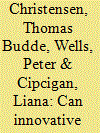|
|
|
Sort Order |
|
|
|
Items / Page
|
|
|
|
|
|
|
| Srl | Item |
| 1 |
ID:
115148


|
|
|
|
|
| Publication |
2012.
|
| Summary/Abstract |
This paper explores the geographical and policy context for an emergent business model from Better Place to deliver battery electric car mobility in Denmark. It argues that the combination of radically different technologies and a highly complex multi-agency operating environment theoretically provide the conditions and requirements for such an emergent business model. While focused on battery electric cars, renewable energy generation and smart grids, the paper has wider applicability to an understanding of the interplay between place, innovation and sustainability which suggests that diverse solutions are likely to be the characteristic solution rather than ubiquity and standardization. The paper argues, however, that the innovative business model, the deployment of electric vehicles, and the use of renewable energy systems, in this case largely based on wind power, while mutually supportive and contributing to wider policy aims with respect to the reduction of carbon emissions, may still fail in the face of entrenched practices. At the theoretical level it is concluded that theorization of business models needs a broader perspective beyond the typical 'value creation, value capture' rubric to better understand the wider role such models have in meeting societal goals, and to understand the structural impediments to organizational and technical innovation.
|
|
|
|
|
|
|
|
|
|
|
|
|
|
|
|
| 2 |
ID:
124404


|
|
|
|
|
| Publication |
2013.
|
| Summary/Abstract |
It is widely accepted that electrification of the transport sector is one of several technological trajectories that could redress some of the environmental issues associated with the growth in travel demand including climate change and oil demand at a global scale, and air quality and noise pollution at the urban scale. Electric vehicles have been considered a promising technology at repeated intervals over the last century, but this promise has not been realised. This paper is a contribution to understanding the key tools and strategies that might enable the successful introduction of new technologies and innovations by exploring the key barriers to electric vehicles encountered in two countries (UK and Germany) where the automobile industry has been historically significant. The study evaluates stakeholders' opinions on relevant regulation, infrastructure investment, R&D incentives, and consumer incentives. The key findings of the research are that the introduction and penetration of EVs is confronted by several barriers that inhibit a larger market penetration under current conditions, which in turn casts doubt on the assumptions of strategic niche management and transitions theory.
|
|
|
|
|
|
|
|
|
|
|
|
|
|
|
|
|
|
|
|
|